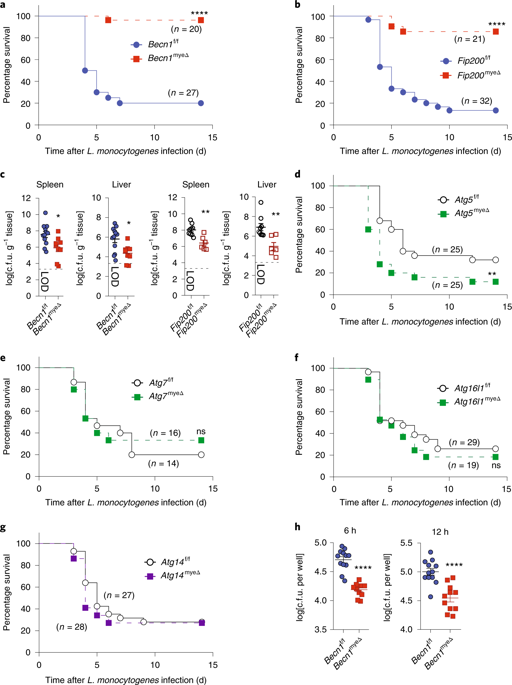Nature Microbiology ( IF 28.3 ) Pub Date : 2020-01-20 , DOI: 10.1038/s41564-019-0633-0 Ya-Ting Wang 1, 2 , Konstantin Zaitsev 1, 3 , Qun Lu 1, 4 , Shan Li 5 , W Timothy Schaiff 1, 6 , Ki-Wook Kim 1, 7 , Lindsay Droit 1 , Craig B Wilen 1, 8 , Chandni Desai 1 , Dale R Balce 1, 6 , Robert C Orchard 1, 9 , Anthony Orvedahl 10 , Sunmin Park 1 , Darren Kreamalmeyer 1 , Scott A Handley 1 , John D Pfeifer 11 , Megan T Baldridge 12 , Maxim N Artyomov 1 , Christina L Stallings 2 , Herbert W Virgin 1, 6

|
Innate and adaptive immune responses that prime myeloid cells, such as macrophages, protect against pathogens1,2. However, if left uncontrolled, these responses may lead to detrimental inflammation3. Macrophages, particularly those resident in tissues, must therefore remain quiescent between infections despite chronic stimulation by commensal microorganisms. The genes required for quiescence of tissue-resident macrophages are not well understood. Autophagy, an evolutionarily conserved cellular process by which cytoplasmic contents are targeted for lysosomal digestion, has homeostatic functions including maintenance of protein and organelle integrity and regulation of metabolism4. Recent research has shown that degradative autophagy, as well as various combinations of autophagy genes, regulate immunity and inflammation5,6,7,8,9,10,11,12. Here, we delineate a function of the autophagy proteins Beclin 1 and FIP200—but not of other essential autophagy components ATG5, ATG16L1 or ATG7—in mediating quiescence of tissue-resident macrophages by limiting the effects of systemic interferon-γ. The perturbation of quiescence in mice that lack Beclin 1 or FIP200 in myeloid cells results in spontaneous immune activation and resistance to Listeria monocytogenes infection. While antibiotic-treated wild-type mice display diminished macrophage responses to inflammatory stimuli, this is not observed in mice that lack Beclin 1 in myeloid cells, establishing the dominance of this gene over effects of the bacterial microbiota. Thus, select autophagy genes, but not all genes essential for degradative autophagy, have a key function in maintaining immune quiescence of tissue-resident macrophages, resulting in genetically programmed susceptibility to bacterial infection.
中文翻译:

选择自噬基因维持组织驻留巨噬细胞的静止并增加对李斯特菌的易感性
先天性和适应性免疫反应,主要骨髓细胞,如巨噬细胞,防止病原体1,2。然而,如果不加以控制,这些反应可能会导致有害的炎症3。因此,尽管受到共生微生物的慢性刺激,巨噬细胞,特别是那些驻留在组织中的巨噬细胞,必须在感染之间保持静止。组织驻留巨噬细胞静止所需的基因尚不清楚。自噬是一种进化上保守的细胞过程,细胞质内容物通过该过程被溶酶体消化,具有稳态功能,包括维持蛋白质和细胞器的完整性以及调节新陈代谢4. 最近的研究表明,降解性自噬以及自噬基因的各种组合可调节免疫和炎症5,6,7,8,9,10,11,12。在这里,我们描述了自噬蛋白 Beclin 1 和 FIP200 的功能——但不是其他重要的自噬成分 ATG5、ATG16L1 或 ATG7——通过限制系统性干扰素-γ 的作用来介导组织驻留巨噬细胞的静止。骨髓细胞中缺乏 Beclin 1 或 FIP200 的小鼠的静止扰动导致自发免疫激活和对单核细胞增生李斯特菌的抗性感染。虽然抗生素治疗的野生型小鼠显示出对炎症刺激的巨噬细胞反应减弱,但在骨髓细胞中缺乏 Beclin 1 的小鼠中没有观察到这种情况,从而确定了该基因对细菌微生物群的影响的优势。因此,选择自噬基因,但并非所有降解自噬所必需的基因,在维持组织驻留巨噬细胞的免疫静止中具有关键功能,从而导致对细菌感染的基因程序易感性。


























 京公网安备 11010802027423号
京公网安备 11010802027423号